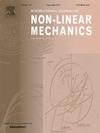Stability analysis for viscoelastic fluid with thermorheological effects: Linear and nonlinear approaches
IF 2.8
3区 工程技术
Q2 MECHANICS
International Journal of Non-Linear Mechanics
Pub Date : 2024-10-16
DOI:10.1016/j.ijnonlinmec.2024.104927
引用次数: 0
Abstract
This study investigates the stability analysis of Rayleigh-Bénard configuration for a viscoelastic fluid subject to thermorheological effects, using the -Chebyshev- method. The fluid is modeled as a third-order viscoelastic fluid. This study accentuates how salting the fluid layer affects the thresholds for the onset of instability in a fluid of third order encompassing physically realistic rigid boundaries. The dynamic model incorporates advection-diffusion of temperature and solute concentration and a modified Navier–Stokes equation. We determine instability thresholds for the complex non-Newtonian fluid by analyzing the linear stability of the steady-state conduction solution. Our analysis proves the strong form of the principle of exchange of stabilities, demonstrating that convective motions can only occur through stationary motion. Additionally, a nonlinear stability analysis using the energy method is performed, deriving an unconditional nonlinear stability criterion. The results provide a comprehensive understanding of how variable viscosity and viscoelasticity impact system stability. Both the viscosity parameter and the third-grade fluid parameter exhibit stabilizing effects. Notably, we observe a discrepancy between the linear and global nonlinear stability results, indicating the presence of a subcritical instability region. This study contributes to the understanding of complex fluid dynamics in non-linear mechanical systems, with potential applications in various industrial and natural processes.
具有热流变效应的粘弹性流体的稳定性分析:线性和非线性方法
本研究采用 D2-Chebyshev-τ 方法,研究了受热流变效应影响的粘弹性流体的雷利-贝纳德构型的稳定性分析。该流体被模拟为三阶粘弹性流体。这项研究强调了盐化流体层如何影响包含物理现实刚性边界的三阶流体的不稳定性阈值。动态模型包含温度和溶质浓度的平流-扩散以及修正的纳维-斯托克斯方程。通过分析稳态传导解的线性稳定性,我们确定了复杂非牛顿流体的不稳定性阈值。我们的分析证明了稳定性交换原理的强形式,证明对流运动只能通过静止运动发生。此外,我们还利用能量法进行了非线性稳定性分析,得出了无条件非线性稳定性准则。研究结果让我们全面了解了可变粘度和粘弹性对系统稳定性的影响。粘度参数和第三级流体参数都表现出稳定效应。值得注意的是,我们观察到线性稳定性和全局非线性稳定性结果之间存在差异,这表明存在亚临界不稳定性区域。这项研究有助于理解非线性机械系统中的复杂流体动力学,并有可能应用于各种工业和自然过程。
本文章由计算机程序翻译,如有差异,请以英文原文为准。
求助全文
约1分钟内获得全文
求助全文
来源期刊
CiteScore
5.50
自引率
9.40%
发文量
192
审稿时长
67 days
期刊介绍:
The International Journal of Non-Linear Mechanics provides a specific medium for dissemination of high-quality research results in the various areas of theoretical, applied, and experimental mechanics of solids, fluids, structures, and systems where the phenomena are inherently non-linear.
The journal brings together original results in non-linear problems in elasticity, plasticity, dynamics, vibrations, wave-propagation, rheology, fluid-structure interaction systems, stability, biomechanics, micro- and nano-structures, materials, metamaterials, and in other diverse areas.
Papers may be analytical, computational or experimental in nature. Treatments of non-linear differential equations wherein solutions and properties of solutions are emphasized but physical aspects are not adequately relevant, will not be considered for possible publication. Both deterministic and stochastic approaches are fostered. Contributions pertaining to both established and emerging fields are encouraged.

 求助内容:
求助内容: 应助结果提醒方式:
应助结果提醒方式:


